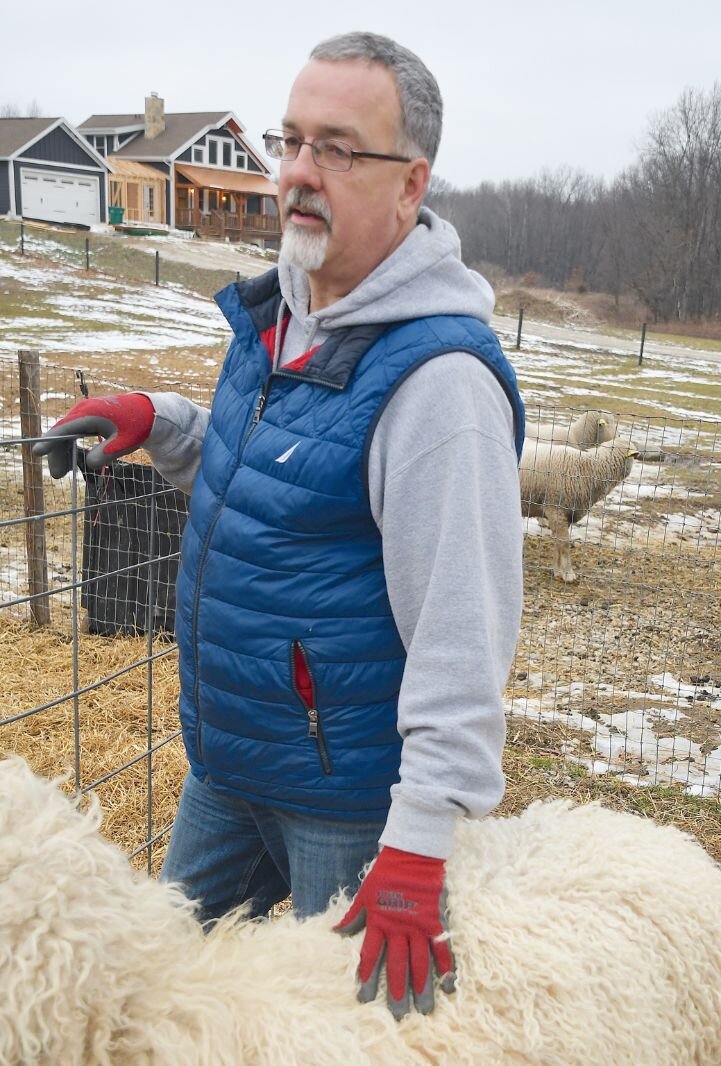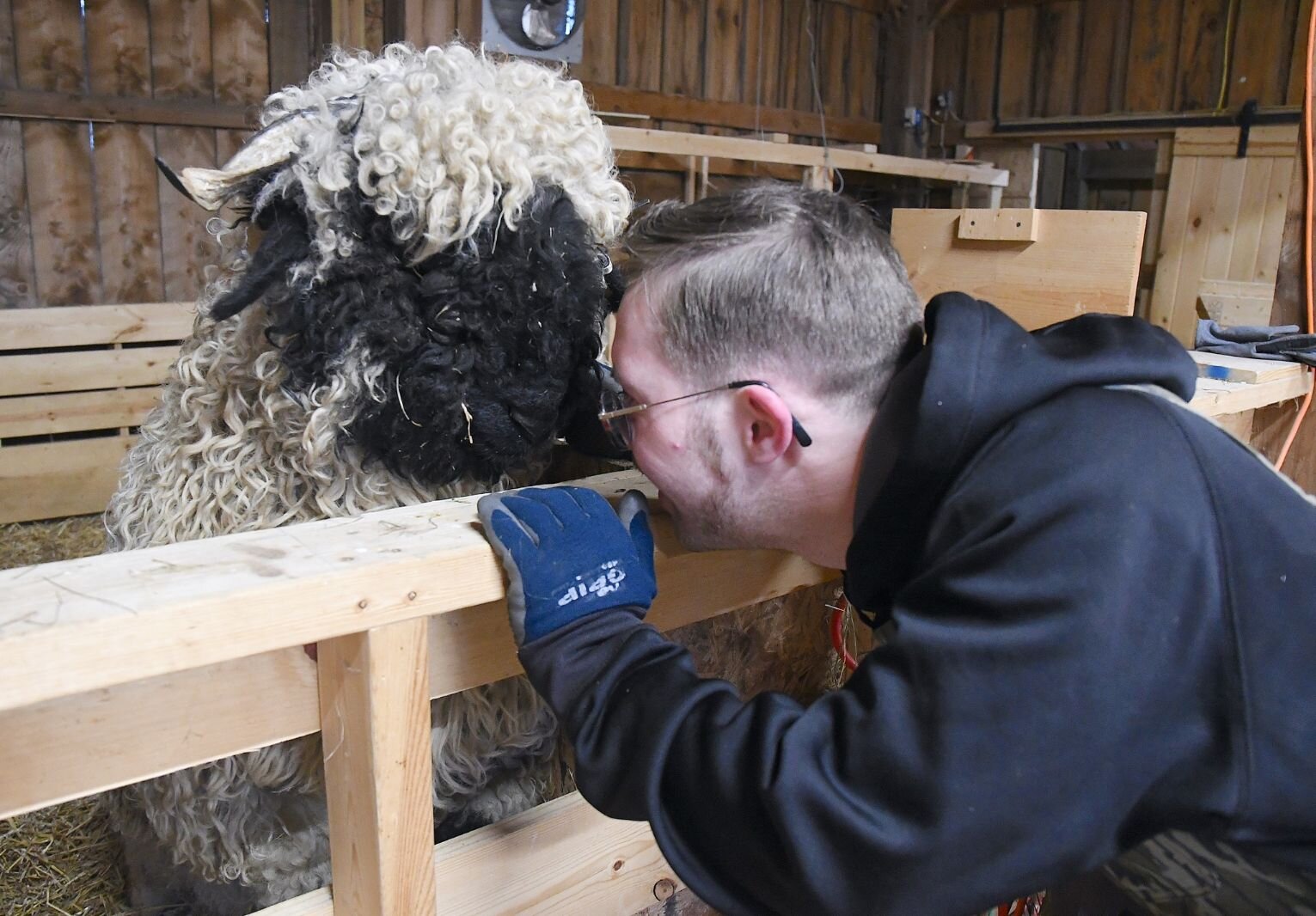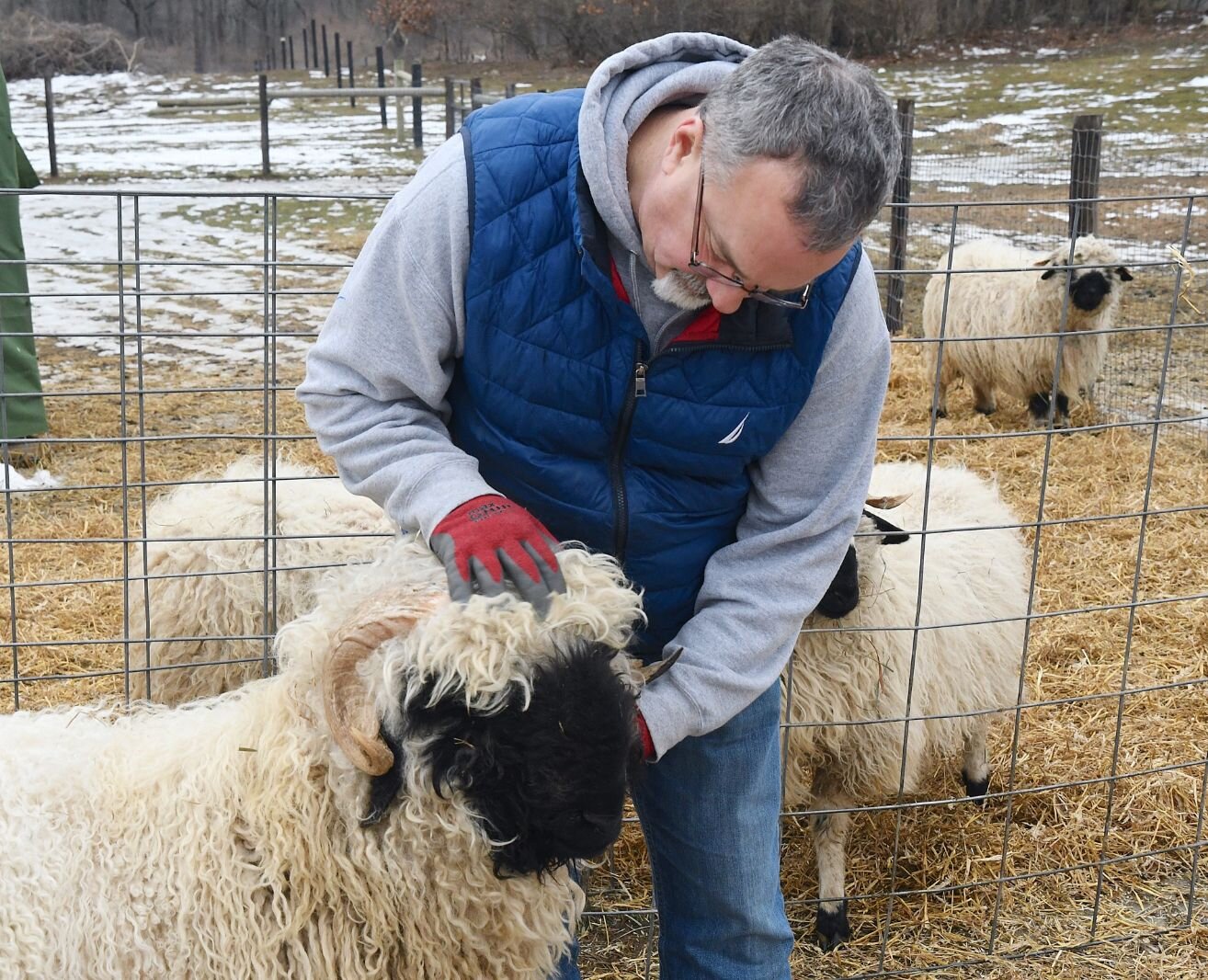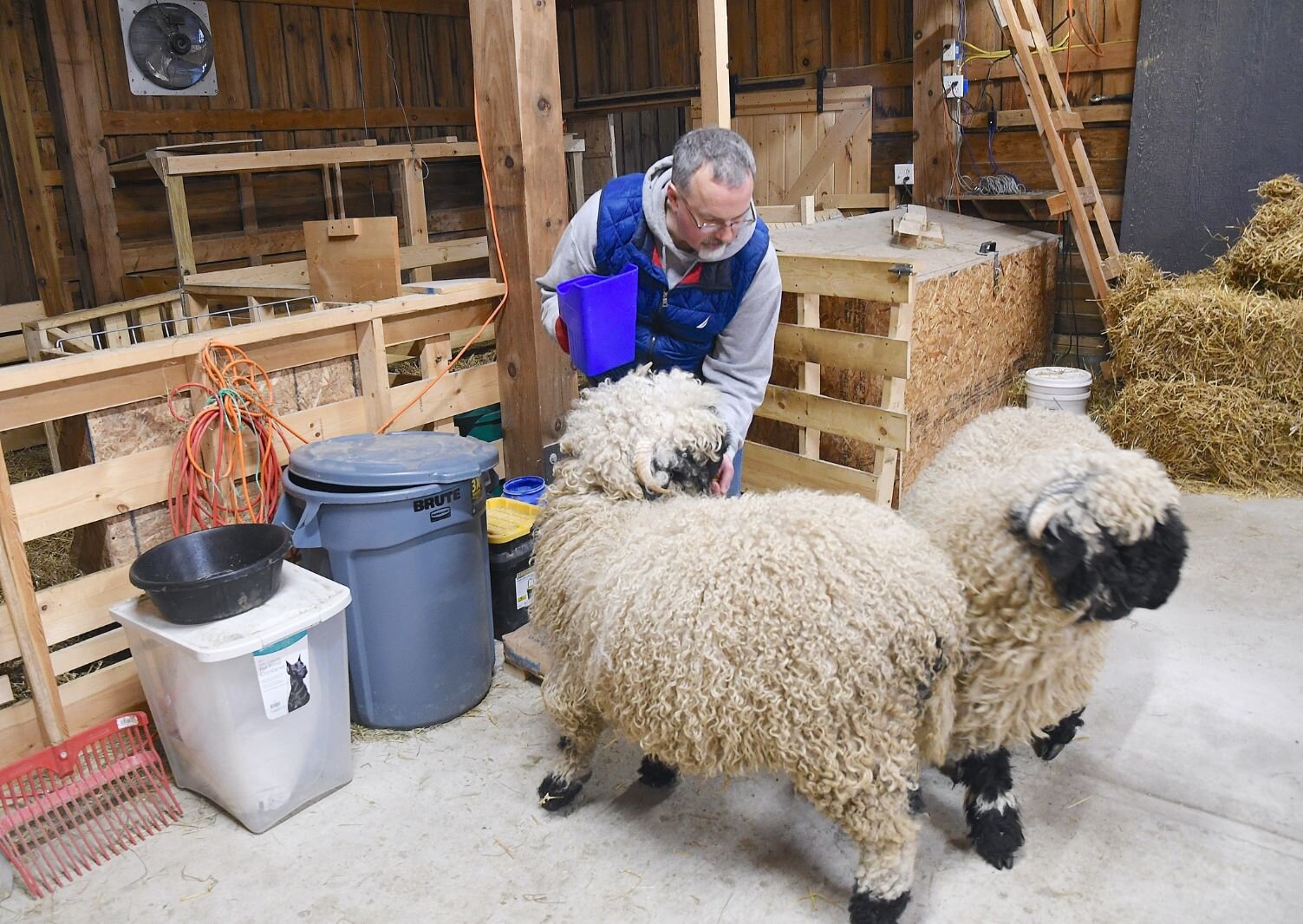Editor’s note: This story is part of Southwest Michigan Second Wave’s On the Ground Battle Creek series.
The breeding and care of Valais Blacknose Sheep has become a pet project for a handful of residents in Calhoun County.
Most sheep in the United States are raised for their wool or meat. Unlike more common sheep breeds, those who raise Valais’ readily admit that they are not cash cows.
“This is not a commercial production. For the people doing it, we are doing it as an interesting enterprise,” says Rob Lyerla, a resident of Leroy Township and Professor of Epidemiology at Western Michigan University. “I’m doing it because it’s fun to be a part of this and the sheep are easy and fun to be around.”
The sheep originated in the Valais region of Switzerland around 1400 A.D. and were recognized as a separate breed in 1962, according to the Valais Blacknose Sheep Society which calls them the “World’s Cutest Sheep.”
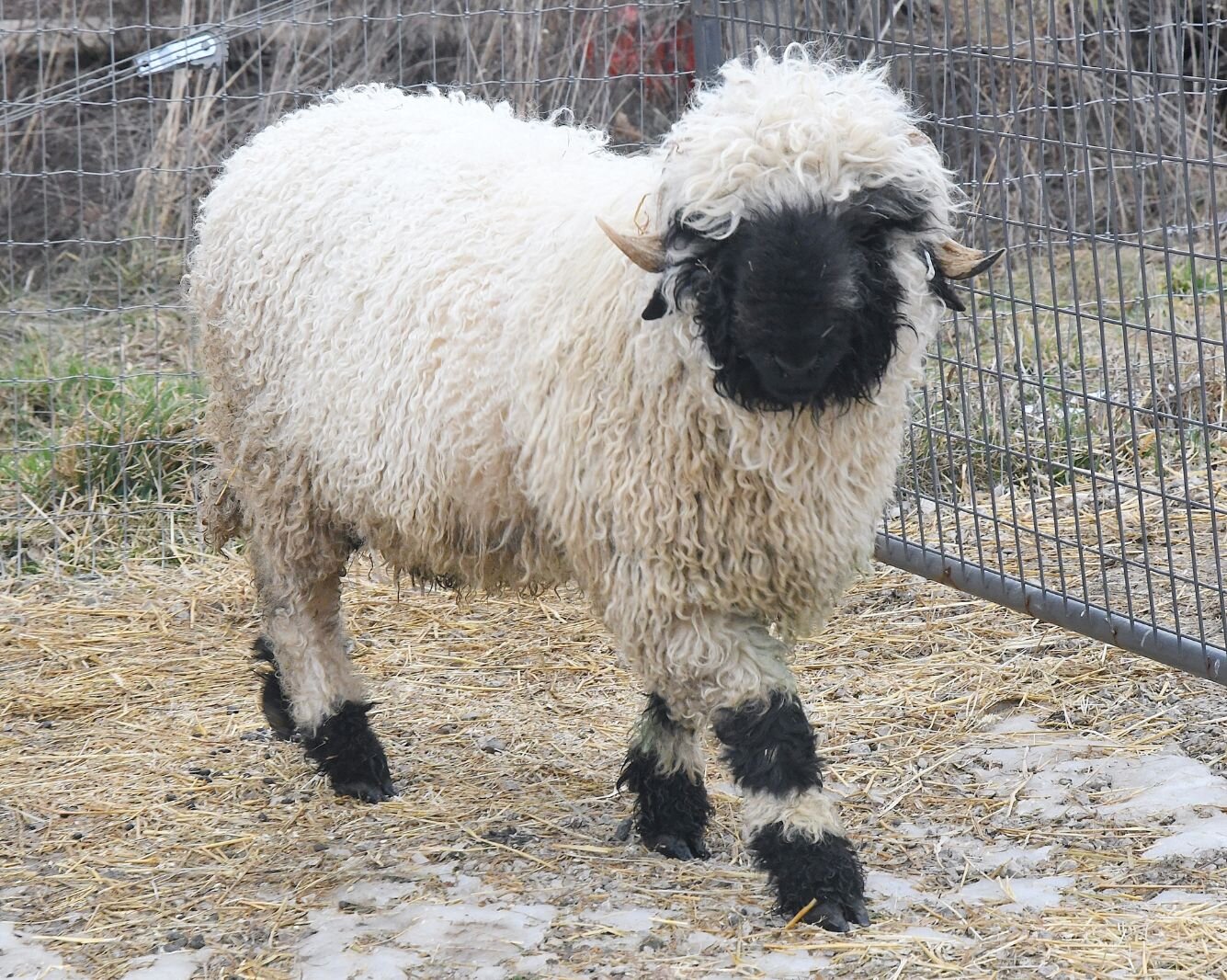
Lyerla agrees. Although not one to make decisions based solely on appearances, he says becoming a Valais breeder was the exception because they are so “cute.” He breeds the sheep on rural farmland property that he owns. He has six Valais’ — two that are half Valais with the remainder being three-quarters. The goal for Lyerla and other breeders is to get 100 percent Valais sheep. Reaching that goal is often time-consuming, costly, and frustrating.
Live Valais sheep cannot be exported from EU (European Union) countries into the U.S. because of health concerns. Primarily found in Switzerland and parts of Germany, the worldwide population of this endangered breed numbers 13,000-14,000, says the Conference of Northern California Handweavers.
This leaves would-be breeders with the option to purchase semen or embryos from New Zealand and the United Kingdom, which have established robust programs for the exportation of the genetic materials, says Joy Dally, who operates Shepherds Lane of Oregon with her husband, Martin is a retired Animal Researcher at the University of California – Davis. The Dallys, based in Lebanon, Oregon, are the largest Valais breeders in the U.S. with a flock of more than 40 purebreds and an additional 50 sheep who are 50 percent Valais on their farm that share space with other sheep breeds and animals, including Border Collies that they also breed.
Because of their breeding operation and extensive knowledge base, the couple is also considered to be the premier national experts on Valais, Lyerla says. Those, like Lyerla, hoping to become Valais breeders look to the Dallys because of their vast network domestically and internationally of veterinarians and suppliers of semen and embryos.
The Valais Blacknose Sheep Society has a membership base of 260; 150 of them are actively breeding sheep, says Dally, a past president of the organization who remains involved as a board member.
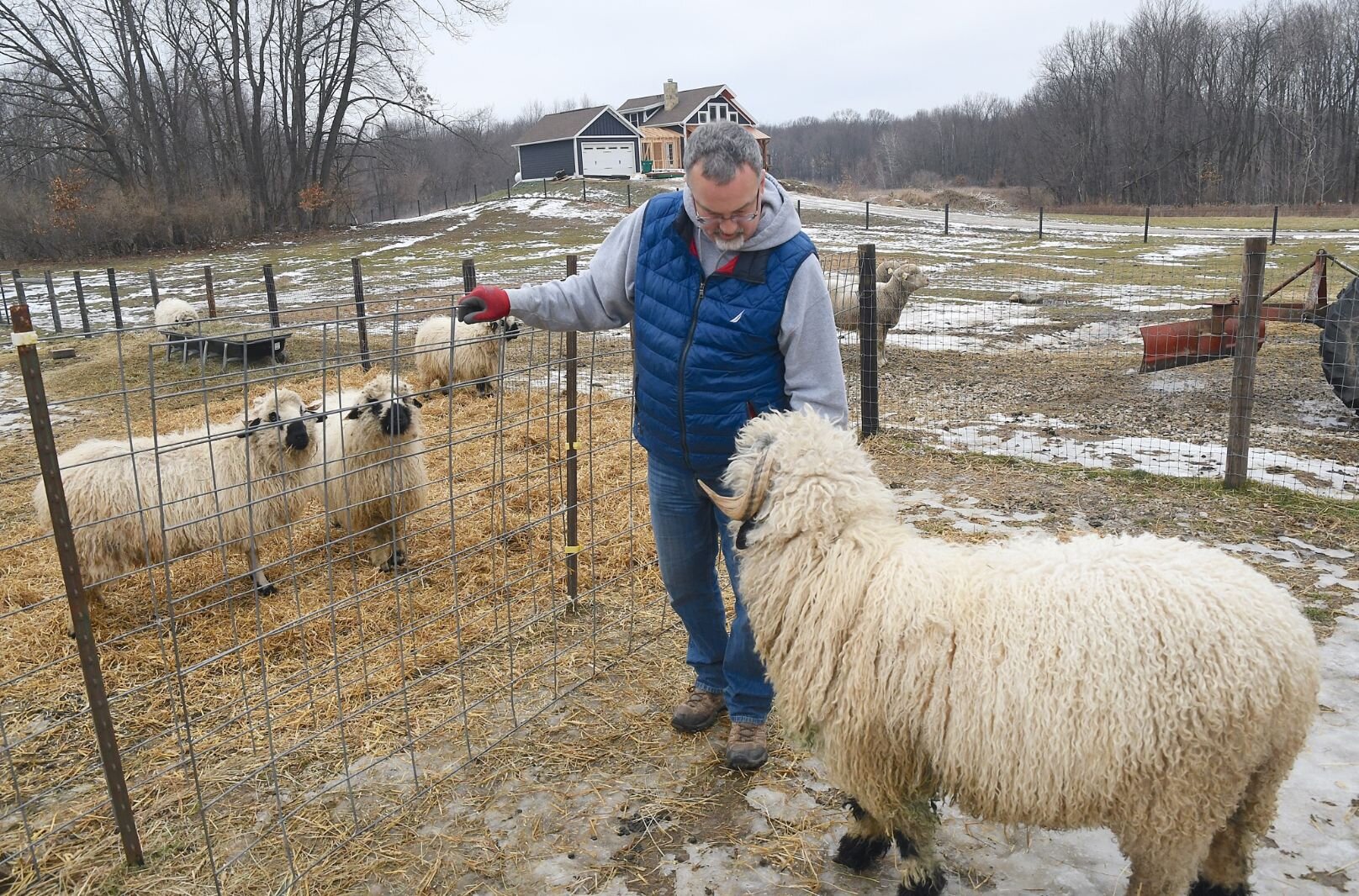
One frozen embryo can cost between $4,000 to $8,000. New Zealand is the main source of these embryos because the country was able to meet rigorous health requirements and international agreements.
However, not every embryo implanted through artificial insemination will produce a lamb.
“When you thaw those and implant them in a recipient, on average you get a 50 percent take rate,” Dally says. “So when you get these animals that are well-marked. They could have arrived with congenital issues and you could lose them in the process of lambing. It’s not for the faint-hearted.”
Mike and Tammy Zebolsky, who live on a 15-acre property in Marshall, imported 10 embryos in 2021 with a retired veterinarian from the Grand Rapids area. They became friends through their shared interest in the breeding of Bernese Mountain dogs. The couple had already been breeding Hampshire sheep.
A vet in Indianapolis who specializes in reproduction implanted two embryos each into five sheep and seven of the ten embryos took, says Mike Zebolsky, an Engineer with Integra Racing Shocks and Springs located in Coopersville. The gestation period of Valais’ is five months.
“We had two of the four recipients that actually took at our place and the vet had two at his place. One of his actually bloated and they had to do an emergency C-section,” he says. “The ewe had twins that lived for about one hour. We had another one that had twin ewe lambs that lived. We had Freya and Ayla, our two ewes, and a ram we named Rambo.”
Their breeding operation is called Timber Haus Farms.
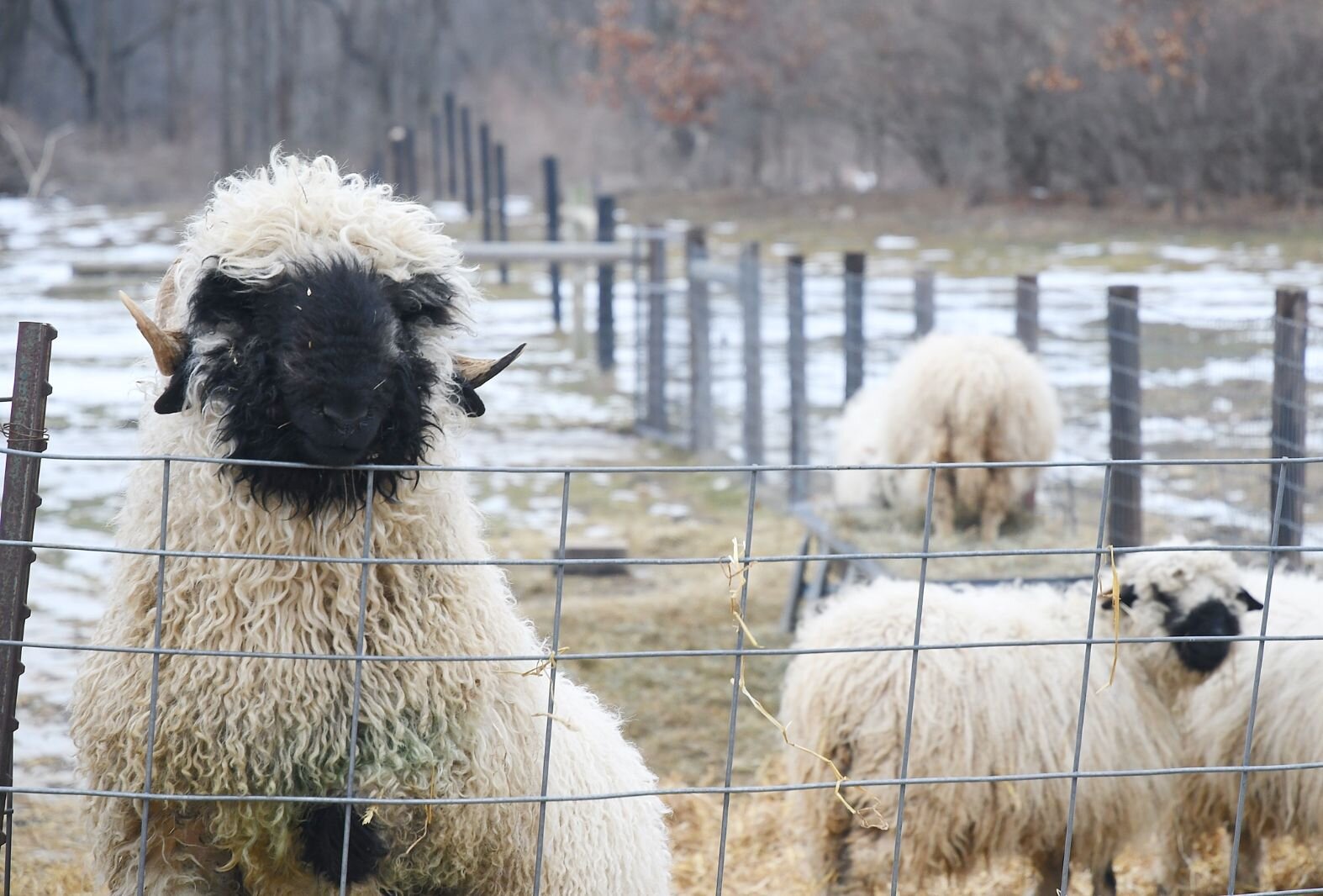
Lyerla recently took his four ewes to Zebolsky’s to be naturally impregnated or live-covered by Rambo.
Each of the 40 Valais at Shepherds Lane was the result of embryo implantation. Dally says after learning about the cost and risk factors she and her husband chose this option.
“We formed a little LLC (Limited Liability Corporation) with a friend of ours in Washington so that we could split the risk and the sheep,” she says.
The other option available to breeders is semen from Valais rams that is packed into straws that look like a coffee stirring stick. Each straw contains one-quarter CC of semen that is diluted, Dally says.
But, this is just the beginning of a process that involves finding a breeder “who’s willing to work with you, pre- and post-collection testing of the animal with the semen, and a quarantine period before entering a collection center to get the semen.
“You can lose a whole lot of money really inefficiently,” Dally says. “Basically it’s a crapshoot. You have to have the will and desire to persevere.”

The embryos and straws are commonly referred to among breeders as “genetics.” Dally says once images of the sheep began circulating on social media, it created a “tidal wave of desire with everyone” clamoring for these genetics, which have their own pricing structures ranging from $250 to $500 per straw.
“Normally when a straw is put up for laparoscopic artificial insemination, it’s designed to service one animal per straw,” Dally says. “I feel like there is some sense of ambiguity in the straw. When you export semen there are some markers that have to be met. You are going to get high-quality semen in that straw.”
Zebolsky says Freya and Ayla were both artificially inseminated in December.
“Freya took and she’s carrying a purebred and Ayla didn’t take so we ended up breeding her with a ram that carries 50 percent of the Valais genes,” he says. “We’ll find out if she’s actually pregnant. Those will be our second homebred lambs.”
Dally says it takes five generations to get a purebred Valais. She says artificial insemination tends to produce a higher number of rams than ewes.
“The way to do any new breed is to do genetic crossbreeding until you’re close to 100 percent,” Lyerla says. “There are about 200 100-percent-pure Valais sheep in the United States. Mike and Tammy have four and I have two that are half and four that are three-quarters and so the next generation will be 88 percent. Every year you add a percentage to your flocks.”
After five generations most breeders will reach 96 percent which geneticists consider to be a purebred animal, Dally says.
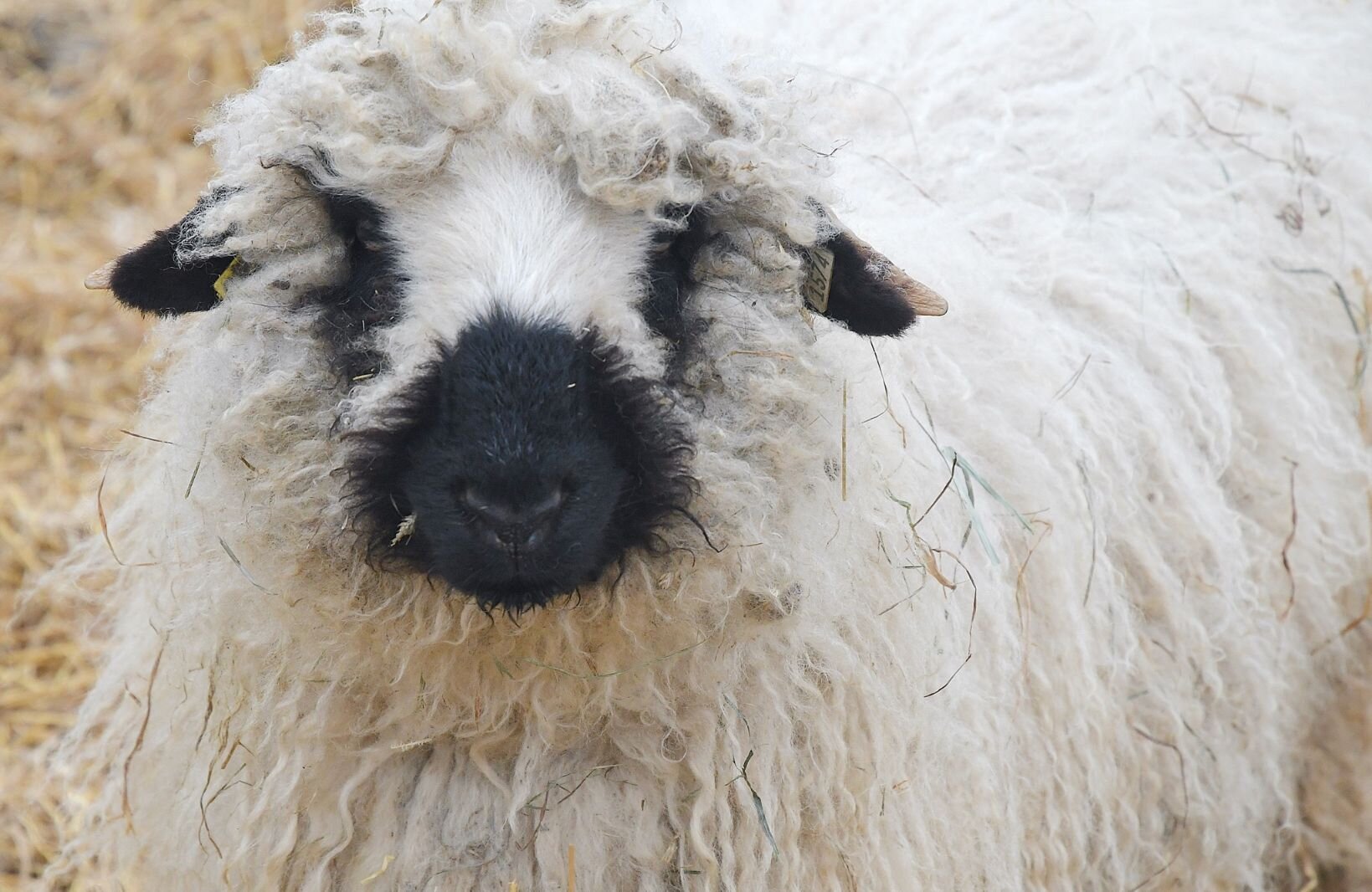
The monetary worth of these sheep varies depending on their percentage purebred status. Zebolsky’s full-blooded Valais ram has a price tag of $15,000 to $20,000. Their average life expectancy is 10 to 12 years.
“The 50 percent animals that we have price out at $3,500 and 75 percent are $5,000 or $6,000 each,” Lyerla says. “Ewes are always worth more than a ram. This is an investment, not a hobby that people take on right away. It’s different than regular sheep production because you don’t butcher them.”
No sheepishness here
When Lyerla bought his property four years ago, he didn’t know what to do with it. He says he asked a veterinarian to come out to get her opinion on its suitability for Valais sheep breeding and raising llamas who would guard those sheep. At the same time, he asked how this would all work and what type of fencing and housing would be required.
Those who own sheep have guard animals, including donkeys or dogs.
“I didn’t want another dog. I have friends in Paw Paw that have alpacas and for me, llamas were a better choice,” he says. “The llamas are like cats. They’re indifferent but very protective.”
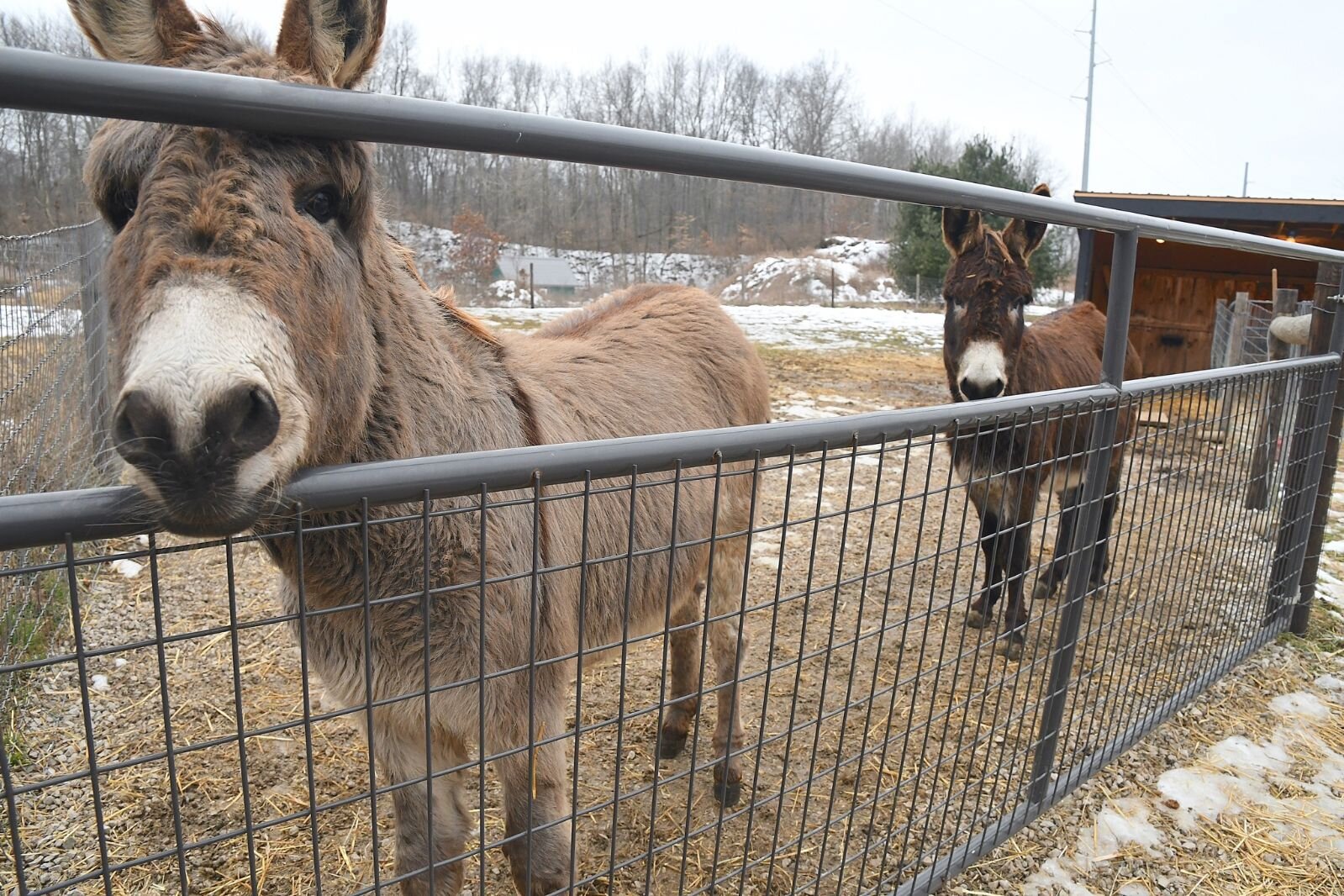
Zebolsky opted for donkeys to watch over his flock. He says Hampshire sheep were the first farm animals he and his wife bred after moving to rural Marshall in 2016. They became interested in the Valais after their veterinarian friend showed the photographs and talked about the breed.
“We got reading about them more and more and just fell in love with them,” Mike Zebolsky says. “They’re just so docile and friendly and with us not being truly farmers, they’re the perfect animal for us.”
Dally likens their personalities to that of Eeyore, of Winnie the Pooh fame.
“They really don’t act like normal sheep. Everyone is attracted to the look of them and then when you sit with them and meet them they really are like dogs. They’ll come right up to you and look up at you like a dog does,” she says. “When I find animals that look for my eyes, it’s like an intelligent being trying to seek another being. They are quite intelligent and everyone thinks sheep are dumb. They like routine. They’re very methodical in their thought process. Valais’ are wired like draft horses. They think before they act.”
Lyerla says that like other sheep the Valais also recognize voices and will come when they are called by name.
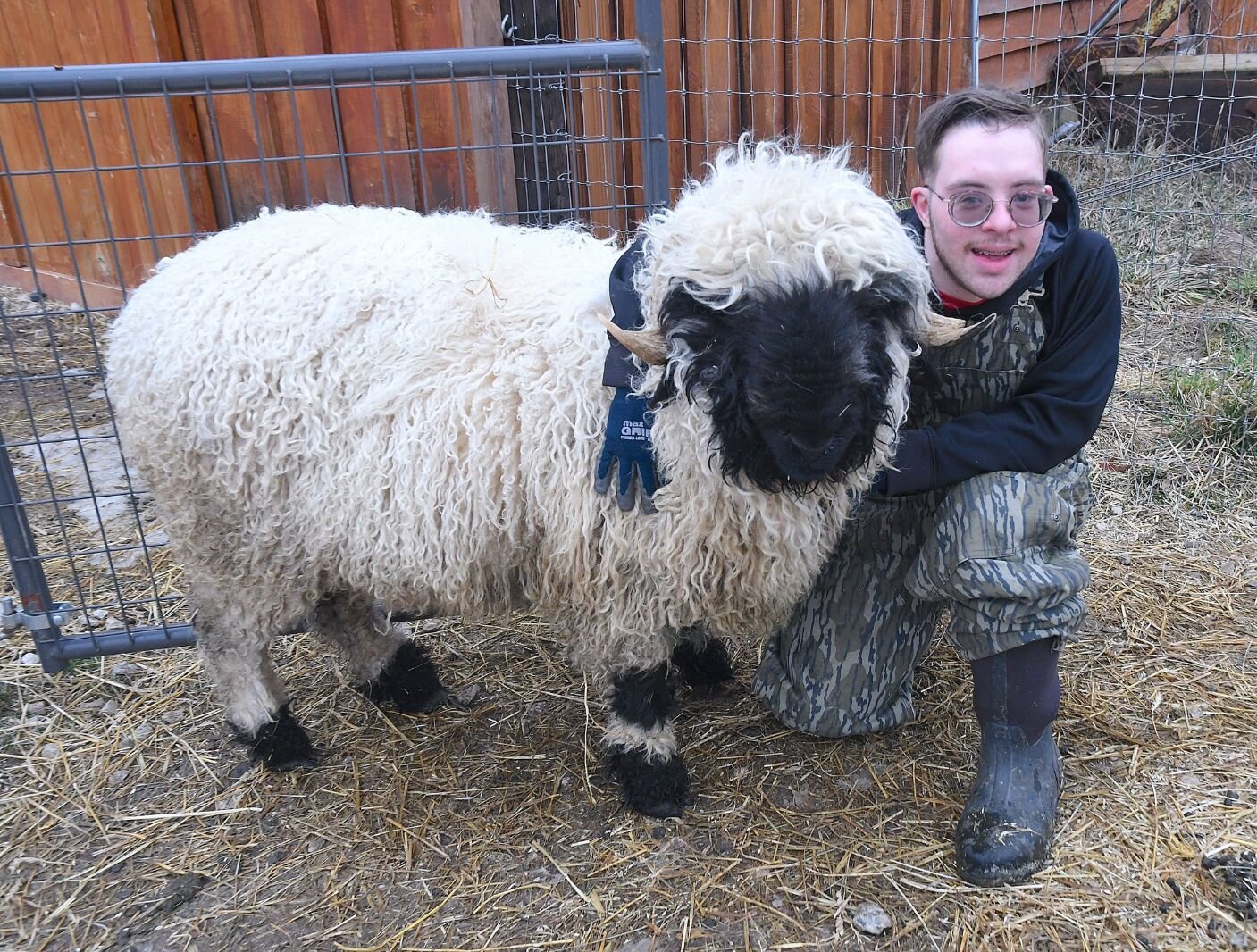
These personality traits make the sheep ideal farm animals for special needs individuals like Zebolsky’s son, Nate, age 21, who willingly takes ownership of their care and feeding. Zebolsky says he and his wife want to phase out the Hampshire flock and grow it into 25 or more purebred Valais’ for their son, one of their three grown children.
“We’re getting not too far from retirement. Why we’re doing it is for Nathan,” Zebolsky says. “Special needs kids like him have such a passion for animals and he does such a great job of working with them. Around here he can have a job working with the sheep. A lot of special needs kids have a connection with animals. We have a long term-vision to somehow make the farm an activity for a number of adults with special needs as a place to go to work to just be part of something.”
“They’re easy to be around and they’re easy to work with,” Dally says of the Valais breed which captured her interest in 2015 after seeing photos of them on social media.
“I found a picture online somewhere. I thought they were photoshopped sheep. I decided to check it out and found out that these things really did exist and they’re kind of a national treasure in Switzerland,” she says. “It kind of mushroomed from there.”
She, Lyerla, and the Zebolskys have heard people question the practicality of breeding a farm animal that won’t benefit them financially. She says people asked the same question when people started breeding alpacas, also a heritage breed that spawned an industry of sorts.
Although not specifically raised for their wool like alpacas, Dally says Valais wool is strong and sturdy and after being processed is an ideal fiber for making rugs, blankets, socks, boot toppers, or hats.
Tammy Zebolsky says she would like to offer a spinning program once she retires from her job as a sixth-grade ELA teacher with the Lakeview School District.
“I will do some small craft work, mostly with the Valais wool. I’m not sure where I’m going with the spinning program and other crafts,” she says. “That’s something I’m looking into.”
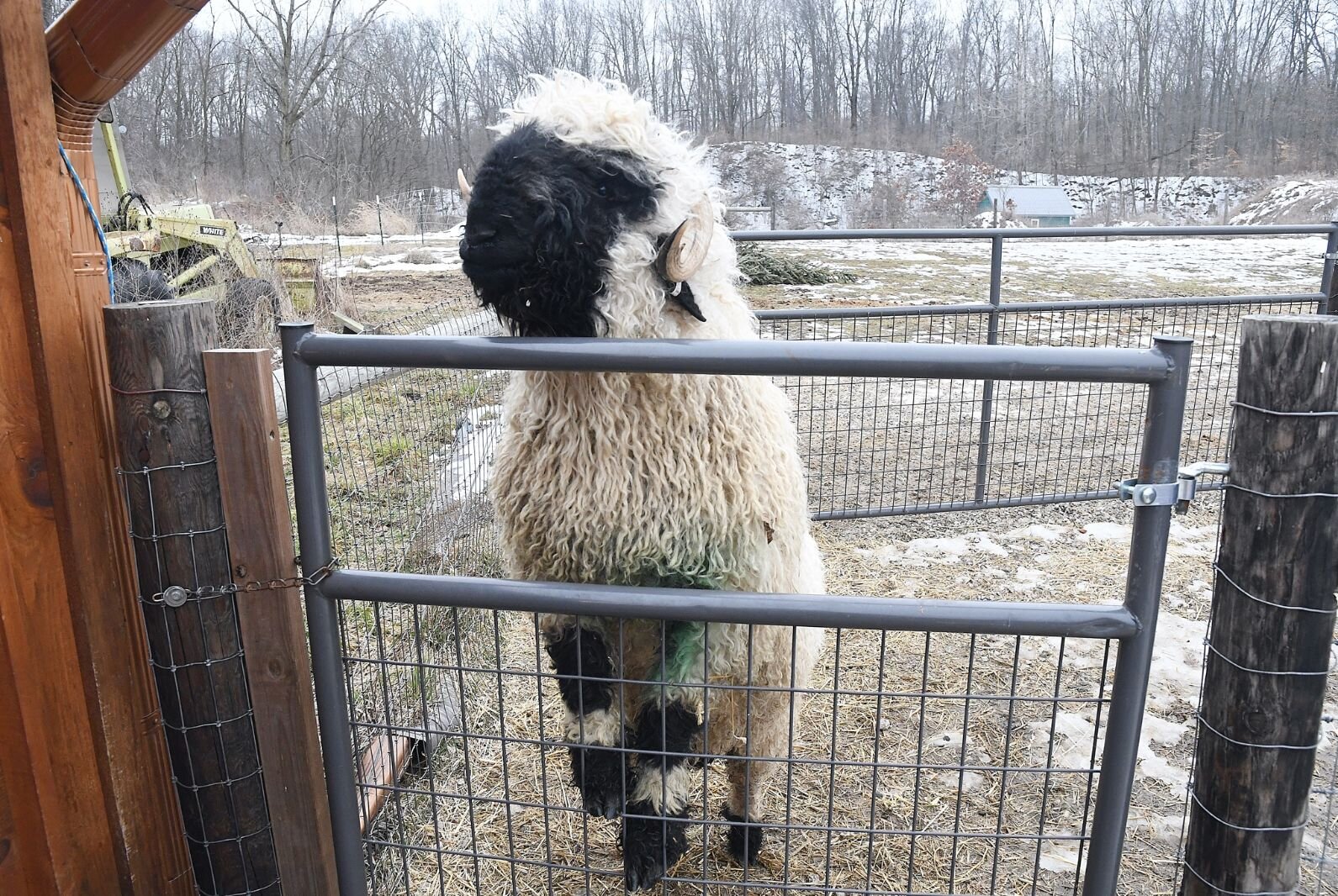
The Valais wool is often mixed with wool from other breeds to get a softer feel. Mike Zebolsky says a lot of people are interested in purchasing the Valais wool for craftwork.
Although Lyerla gives away the wool produced during the twice-yearly shearing of his sheep, he says he knows of a breeder who was selling her wool for $65 a pound.
“There are artisans who want this wool,” he says.
“It’s beautiful fiber with tons of potential that we haven’t explored yet,” Dally says.
Because of their heritage-breed status, Dally says she thinks Valais will find their way into the exotic pet market. She says she has been receiving inquiries from petting zoos among others.
“No one’s going to eat them and they’ll never have a place in the commercial farm animal market,” Dally says.“They are destined to be park sheep on estates or in pastures where people want to see 10 or 20 of them out there.”


